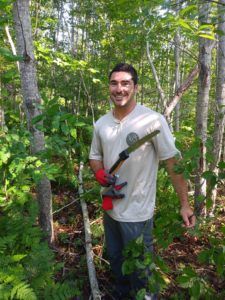OTG in the Pigeon River Country
On Saturday, August 17, 14 volunteers came out to the Pigeon River Country State Forest to improve wildlife habitat near the Pickerel Lake State Forest Campground. The goal of the project was to perform an “oak release” by clearing out early successional tree species (4 inch DBH or less) that were crowding the canopy and preventing oaks from developing in the understory. Oaks are a hard mast-producing species that benefit an abundance of wildlife, but often have stunted growth when disturbance-adapted species like maple and aspen outcompete them for resources.
developing in the understory. Oaks are a hard mast-producing species that benefit an abundance of wildlife, but often have stunted growth when disturbance-adapted species like maple and aspen outcompete them for resources.
To resolve this issue in a 19-acre plot of forest, volunteers used a mixture of hand saws, pruning shears and chainsaws to remove some of the early successional species that were crowding out the abundant oak seedling and saplings found throughout the stand. Volunteers were spread out across the project site, each being mindful of the trees they were taking as they went.
If you are walking along the Pickerel Lake trail where the project was completed, you will notice the project site due to the open canopy and remaining slash. Habitat work does not always result in the most aesthetically-pleasing scenes, but our volunteers partnered today to work for wildlife and set this patch of forest on the right ecological track for enhanced native wildlife habitat for years to come.
We would like to thank all of our great volunteers that donated their Saturday for wildlife habitat. We had local conservationists, an MUCC Past President and Board Member, DNR staff, Huron Pines AmeriCorps members, a Rocky Mountain Elk Foundation member, Consumers Energy staff and Ruffed Grouse Society members that helped make this project a success. No matter how you celebrate your outdoor heritage, OTG is a great way to get outdoors and make a difference for wildlife in Michigan.
conservationists, an MUCC Past President and Board Member, DNR staff, Huron Pines AmeriCorps members, a Rocky Mountain Elk Foundation member, Consumers Energy staff and Ruffed Grouse Society members that helped make this project a success. No matter how you celebrate your outdoor heritage, OTG is a great way to get outdoors and make a difference for wildlife in Michigan.
As the summer season winds down, so does our OTG field season. Our last event is on Friday, September 6 at the Gratiot Saginaw State Game Area. If you would like to attend this event, please register here (free lunch and t-shirts provided). All are welcome to join us for a great day outdoors practicing conservation before the long winter sets in.
If you have questions about the On the Ground program, please contact MUCC Habitat Volunteer Coordinator Makhayla LaButte at mlabutte@mucc.org.
The post OTG in the Pigeon River Country appeared first on Michigan United Conservation Clubs.
Recent Posts



